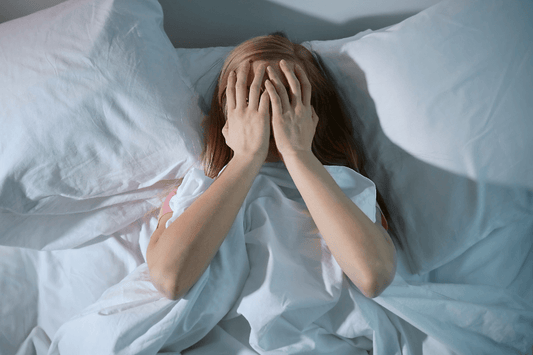Tired of not being able to sleep? Menopause might just be to blame! Not only does menopause affect your moods and body temperature (hot flashes and cold sweats), but it can also change the quality of your sleep.
Yes, your hormones torture you in more ways than one! Women who had absolutely no issues falling asleep and staying that way are now — thanks to those hormonal fluctuations — wrestling with insomnia (Yes, that means that pesky tossing and turning, night after night!). And as an added "bonus," you may also struggle with an inability to stay asleep once you finally manage to conk out.
According to the statistics, up to 47% of women going through perimenopause are dealing with sleep issues. And problems catching those ZZZs at night doesn't just stop there, because up to 60% of all women that have gone through menopause still have problems slumbering at night. We know - not great news, is it? The real question here is: why? Why does menopause make it so tough to fall asleep and stay that way? We know you want some answers to your sleepless bouts, so let’s dive in!
Estrogen Affects Serotonin

Let’s talk about those hormones! Estrogen, one of the reproductive hormones that fluctuates during perimenopause before dropping drastically once you reach menopause, also plays an active role in your brain's serotonin levels.
Serotonin, also known as the "feel good hormone" is responsible for leveling out your mood, keeping you asleep, and ensuring that your digestive system is working properly, among other things.
As you go through perimenopause, your fluctuating amounts of estrogen also make your serotonin levels go up and down as well. This affects everything from your mood (leading to those drastic swings from happy to angry in 3 seconds flat) to your sleep quality.
Without the proper amounts of serotonin in your brain, you could suffer from insomnia and may find yourself waking up multiple times a night. But that's not all…
Anxiety Keeps You Tossing and Turning

Oh, those sleepless nights! We would all give them the boot if we could, right? The changes in hormone levels during menopause often trigger anxiety as well. Those who already suffer from GAD (General Anxiety Disorder) may find it getting worse, and women who've never had an anxiety disorder may discover that they now do.
No matter which camp you fall into, it all adds up to a bad night's sleep. Every little noise may wake you up, leaving you laying there, staring at the ceiling, and worrying about what's going on outside or in your home.
You may even find your mind racing as you try to fall back asleep, as you constantly go over certain trivial situations in your head, make mental lists, or think of everything you need to do tomorrow. We’ve all been there, and it’s definitely no picnic!
Hot Flashes Make You Uncomfortable

Let’s be honest - there are few things that make you feel as completely uncomfortable as a hot flash. They come on without warning and, if you're neatly wrapped in blankets at night, can leave you shivering in a cold sweat.
Not only can low hormone levels cause these hot flashes, but they can affect your overall temperature as you’re sleeping. You see, your serotonin levels are responsible for lowering your body temperature at night, making it easier to sleep soundly.
Once perimenopause hits, those levels begin to fluctuate, throw off that oh-so-comfortable balance, and interrupt your sleep.
Sleep Apnea Becomes a Problem
We bet you’ve heard of sleep apnea but never thought you’d be the one shooing it away, right? That dreaded weight gain (mostly in the belly and thighs) that tends to unwantedly accompany menopause causes your BMI to rise.
In turn, this extra weight can lead to sleep apnea, a condition where you briefly stop breathing in the night.
Once this happens, you wake up immediately (usually) and begin breathing again, but the damage has been done – you're awake.
While sleep apnea can be helped by losing weight and a CPAP machine, it's yet another way in which menopause deviously destroys your chances of getting a good night's sleep.
The Perfect Solution: Melatonin & Passionflower
Luckily, we still have good news for you! Looking for an all-natural way to sleep through the night despite those fluctuating hormones?
Melatonin and passionflower will do the trick! This supplement contains a one-two punch that will help regulate your sleep-wake cycles, helping you sleep better and relax, keeping that anxiety at bay during the night.
On top of that, taking the supplement in gummy form means that they taste good, are fun to consume, and begin absorption quickly through the mouth. MenoSnooze Gummies contain both melatonin and passionflower, which has a calming effect on the body.

Combined, you'll sleep better than ever before. After all, we all know getting some good ZZZ’s ensures you’re feeling fabulous and ready to take on the world the next day!
If you need some exra help getting to sleep and staying asleep, then check out MenoSnooze gummies — a natural sleep aid containing melatonin and passionflower that’s designed specially to help menopausal women get a restful night’s sleep and wake up feeling refreshed.




